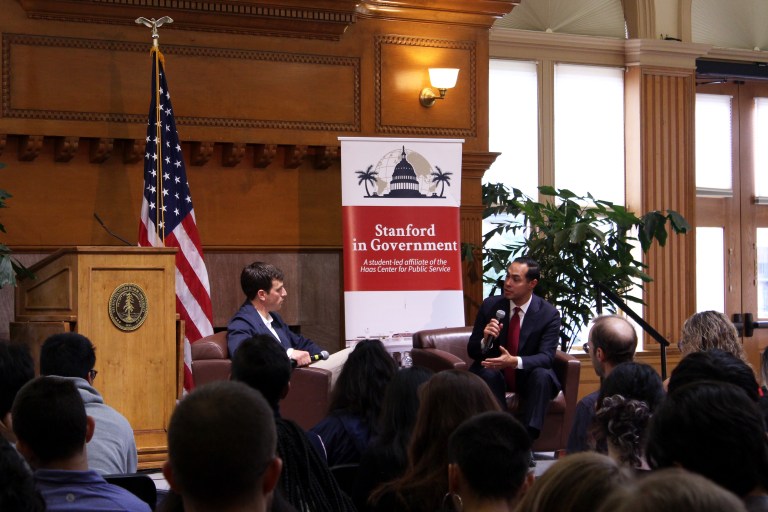Former Secretary of Housing and Urban Development Julián Castro ’96 announced the end of his 2020 presidential campaign early Thursday morning. The statement — in the wake of disappointing polling numbers that kept him out of recent debates — caps a bid for the Democratic nomination in which Castro pushed the envelope with progressive policy proposals on immigration, policing and economic justice.
“It’s with profound gratitude to all of our supporters that I suspend my campaign for president today,” Castro tweeted.
Castro, who also served as the mayor of San Antonio, was one of three Stanford alumni in the presidential race, joining Sen. Cory Booker ’91 M.A. ’92 (D-N.J.) and former Stanford trustee Tom Steyer M.B.A. ’83. At a campus event in fall, Castro cited his time at Stanford as a catalyst for his interest in politics.
At Stanford, Castro and his twin brother, Rep. Joaquin Castro (D-Tex.), served on the Associated Students of Stanford University (ASSU) Undergraduate Senate, advocating for reforms ranging from course transparency to improved advising.
“Maybe we’ll be councilmen in two separate city council districts at the same time,” Joaquin told The Daily in 1995.
Far surpassing these initial ambitions, Joaquin now represents Texas’s 20th congressional district and served as Julián’s campaign manager.
Julián’s presidential campaign emphasized bold, progressive policies, especially on immigration reform and criminal justice reform. He made waves in the June Democratic presidential debate when he advocated decriminalizing unauthorized border crossings, and was hailed by social justice activists when he highlighted victims of police shootings.
“We’ve been standing up for the most vulnerable folks in this country,” he said in a video announcing the end of his campaign.
His emphasized this theme in two recent visits to Stanford.
During an event focused on foreign policy last month, Castro spoke about America’s responsibility to protect the vulnerable around the world. He described his vision of America as a “nation of moral authority that stands up for human rights.”
Last March, Castro also attended a Service Employees International Union (SEIU) Local 2007 meeting to voice his support for Stanford’s service workers and staff. Citing soaring housing costs in areas such as East Palo Alto, Castro urged Stanford to pay all of its staff members a “living wage.”
Throughout his campaign, Castro has spoken candidly about his Latino identity and experience growing up in San Antonio with a single mother. His exit leaves the Democratic primary without a Latino candidate. After a historically diverse start to the primary, the January Democratic debate may feature no candidates of color.
Castro has not shied away from arguing that systemic challenges make it harder for minority presidential candidates to find success. He recently criticized Iowa and New Hampshire’s disproportionate influence on the primary as the first two states to cast their votes.
“Demographically, it’s not reflective of the United States as a whole, certainly not reflective of the Democratic Party, and I believe that other states should have their chance,” Castro said.
When Sen. Kamala Harris (D-Calif.) dropped out of the race in November, Castro tweeted, “the media’s flawed formula for ‘electability’ has pushed aside women and candidates of color.”
Despite ambitious ideas, Castro, who began laying off campaign staff in November, struggled to gain widespread support. His polling averages have stagnated around 1%, and his fundraising has lagged behind other major candidates.
“It simply isn’t our time,” he said in his exit campaign video. Nonetheless he struck an optimistic tone. “We’ve shaped the conversation on so many important issues in this race, stood up for the most vulnerable people and given a voice to those who are forgotten … I’m not done fighting.”
Castro’s exit immediately prompted an outpouring of praise from the other candidates.
Sen. Elizabeth Warren (D-Mass.) thanked Castro “for being a powerful voice, for proposing bold and progressive plans, and for using your campaign to help people who need it now.”
Booker tweeted, “Your voice and campaign were invaluable in sticking up for underrepresented communities and pushing the field forward.”
Contact Lena Han at lahan ‘at’ stanford.edu.
